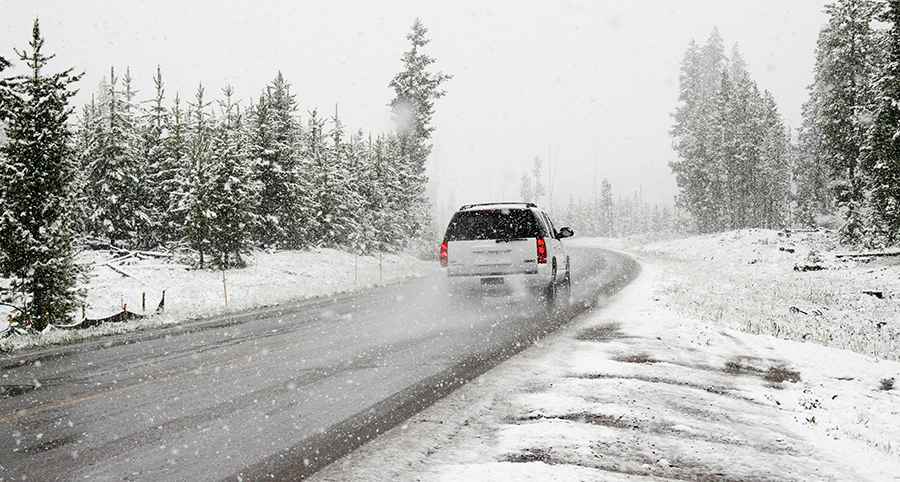How Drivers Can Avoid Road Accidents in Winter on Snowy US Roads
In December and January, many parts of America turn into winter postcards. The masses of snow deposited on roofs and backyards bring visions of cozy family get-togethers and piping-hot meals. Not to be a spoilsport, but this season is also when road safety takes a hit.

States like Colorado have recently witnessed many accidents due to heavy snowfall. In early December 2024, the police were on accident alert due to the frequent crash reports. Road conditions were also dangerous last winter. Fierce storms compelled the National Weather Service to issue warnings and declare that the driving conditions were likely treacherous.
Why Does Winter Compromise Road Safety?
The US Department of Transportation notes that over 70% of America’s roads are in snowy areas. Every year, they receive over five inches of snowfall. A disturbing 24% of weather-related crashes happen on snowy or slushy tracks.
A significant safety risk is lower visibility due to snow storms and overcast skies. It becomes harder to spot other vehicles on the road, which leads to more collisions. Secondary crashes can also become more common in winter. Low visibility makes it likelier for cars to crash into an existing crash site.
Snow can increase the risk of skidding due to lower friction and less control over the vehicle’s maneuverability. Cars can be prone to skidding if their wheels are not well-maintained or aging.
Road Safety Technology for Safer Driving in Winter
The rising number of road accidents in winter has prompted many technology giants to develop safety technology. Implementing this in your vehicle is a solid, assertive step toward safeguarding yourself and your loved ones.
Automatic emergency braking is an excellent way to avoid collisions in compromised visibility. It uses sensors to detect if the minimum safe distance between your vehicle and the one ahead of you gets breached. If so, the system activates the brakes, preventing a potentially lethal collision.
Another intuitive safety technology is intelligent speed control. It ensures that you always drive within the permissible speed limit in an area. The system issues warnings if you cross the limit. Driving slowly and cautiously is even more critical on dull, snowy days when skidding becomes a potential hazard.
You can also explore other technologies like cruise control to maintain optimal driving throughout your trip. Artificial intelligence has now made predictive analytics insightful and highly capable. You can expect more accurate weather predictions. Tailored driving advice and updates on traffic conditions will help you understand what you’re up for when venturing out.
Heightened Vigilance in Accident-Prone Areas
Some regions face the brunt of winter worse than others. For example, Colorado can be severely cold in December and January. The state has mountain ranges all around, which bring heavy snow and chilly winds at this time.
These conditions make some roads, especially those near mountain passes, treacherous. According to the Edwardsville Intelligencer, the city witnesses a 41% spike in weather-related car crashes during winter. Low visibility, slippery roads, and snowfall are the main reasons. However, at times, accidents do happen due to driver negligence.
Seeking prompt medical and legal counsel is also crucial if you face an accident despite being vigilant. The blame for a crash can be on multiple parties, including other drivers, poorly maintained roads, and malfunctioning vehicles. Consulting an Edwardsville personal injury attorney will help you understand the situation and claim compensation for your damages.
Injuries sustained in winter can be riskier than they first appear. The healing process may also be longer. It makes immediate medical help essential. TorHoerman Law notes that a professional medical diagnosis and recommended treatment will also help your legal case. It will give a strong foundation to your claims and speed up the process.
Remaining Patient During Road Closures
Safety closures are prevalent in several states of America in winter.
Excessive snow accumulation can lead to a closure for several hours. It can increase travel time and fuel impatience among waiting drivers and passengers.
While waiting, your goal should be to save gas and stay as warm as you can. You can have the engine on and off occasionally to keep things going. It is also a good idea to keep extra layers and rugs in the car in preparation for such events. Staying warm will help you keep calm and avoid the temptation to honk or bump into other vehicles.
Elementary Road Safety Advice is Still Relevant
Amid these emerging technologies, the relevance of standard advice on road safety has not diminished. It refers to putting on your seat belt and obeying road rules. While this seems elementary, some recent studies reveal disturbing insights on seatbelt use in America.
The Journalist’s Resource reports that around 10% of the US population does not wear a seatbelt while driving. A higher percentage does not use a seatbelt in the rear seat. These habits may be more common among older males.
Not staying buckled up can increase your risk of ejection from the car in case of a crash. With skidding and other accidents likelier in winter, being stringent about belts is mandatory.
Not following the road rules may be linked to poor impulse control. Other behaviors that can emerge from this include texting in the driver’s seat and driving under the influence. Addressing this concern is urgent for the safety of everyone involved – the driver, passengers, and other vehicles on the road.
As winter deepens its grip on the country, stay safe and be careful on the road. Before going out in bitter weather, you must check your vehicle is in stable condition.
When possible, public transport is also worth considering at this time. Watching the snowfall can be more calming when sitting peacefully by the window, your hands around a cup of hot chocolate, rather than stuck out in a storm.
Pic: https://www.pexels.com/photo/white-suv-on-road-near-snow-covered-trees-12875/